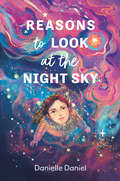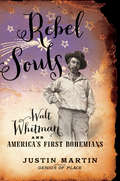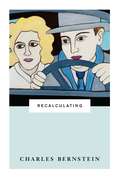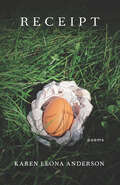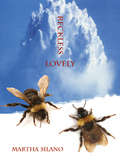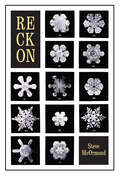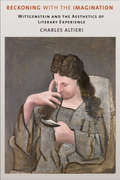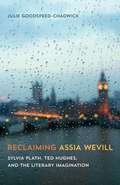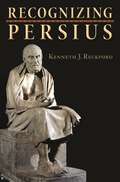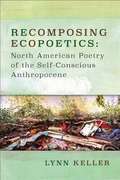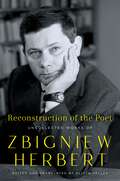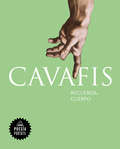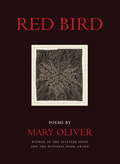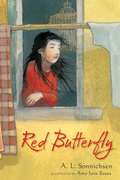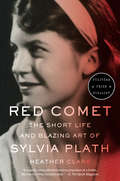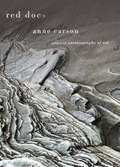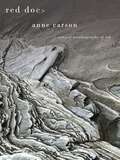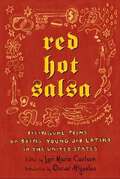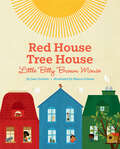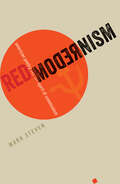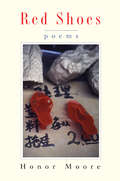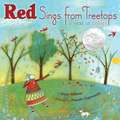- Table View
- List View
Reasons to Look at the Night Sky
by Danielle DanielA sensitive middle grade novel in verse about a space-obsessed girl who dreams of becoming an astronaut — and begins to see the world differently when a substitute teacher enters her orbit.Luna has always loved the night sky. She's an eleven-year-old who knows everything there is to know about space, and dreams of one day becoming an astronaut. The first step in her plan to get there is to ace the space unit in her science class and secure a spot in NASA's summer space camp.But when Luna's teacher is unexpectedly replaced with a substitute, Ms. Manitowabi, who is looking to shake up science class by bringing in art, Luna's carefully laid plans are crushed. And that's not all that's shifting in Luna's life — changes at home and in her friendships have her feeling topsy-turvy. What on Planet Earth is happening? Reasons to Look at the Night Sky is an endearing, poetic look at the inner world of a middle schooler grappling with change from acclaimed author and illustrator Danielle Daniel.
Rebel Souls: Walt Whitman and America's First Bohemians (A Merloyd Lawrence Book)
by Justin MartinIn the shadow of the Civil War, a circle of radicals in a rowdy saloon changed American society and helped set Walt Whitman on the path to poetic immortality.<P><P> Rebel Souls is the first book ever written about the colorful group of artists-- regulars at Pfaff's Saloon in Manhattan--rightly considered America's original Bohemians. Besides a young Whitman, the circle included actor Edwin Booth; trailblazing stand-up comic Artemus Ward; psychedelic drug pioneer and author Fitz Hugh Ludlow; and brazen performer Adah Menken, famous for her Naked Lady routine. Central to their times, the artists managed to forge connections with Ralph Waldo Emerson, Mark Twain, and even Abraham Lincoln. This vibrant tale, packed with original research, offers the pleasures of a great group biography like The Banquet Years or The Metaphysical Club. Justin Martin shows how this first bohemian culture--imported from Paris to a dingy Broadway saloon--seeded and nurtured an American tradition of rebel art that thrives to this day.
Recalculating
by Charles BernsteinLong anticipated, "Recalculating" is Charles BernsteinOCOs first full-length collection of new poems in seven years. " "As a result of this lengthy time under construction, the scope, scale, and stylistic variation of the poems far surpasses BernsteinOCOs previous work. Together, the poems of "Recalculating "take readers on a journey through the history and poetics of the decades since the end of the Cold War as seen through the lens of social and personal turbulence and tragedy. aThe collectionOCOs title, the nowOCofamiliar GPS expression, suggests a change in direction due to a mistaken or unexpected turn. For Bernstein, formal invention is a necessary swerve in the midst of difficulty. As in all his work since the 1970s, he makes palpable the idea that radically new structures, appropriated forms, an aversion to received ideas and conventions, political engagement, and syntactic novelty will open the doors of perception to exuberance and resonance, from giddiness to pleasure to grief. But at the same time he cautions, with typical deflationary ardor, OC The pen is tinier than the sword. OCO In these poems," "Bernstein makes good on his claim that OC the poetry is not in speaking to the dead but listening to the dead. OCOaIn doing so, "Recalculating "incorporates translations and adaptations of Baudelaire, Cole Porter, Mandelstam, and Paul Celan, as well as several tributes to writers crucial to BernsteinOCOs work and a set of epigrammatic verse essays that combine poetics with wry observation, caustic satire, and aesthetic slapstick. aFormally stunning and emotionally charged, "Recalculating "makes the familiar strangeOCoand in a startling way, makes the strange familiar. Into these poems, brimming with sonic and rhythmic intensity, philosophical wit, and multiple personae, life events intrude, breaking down any easy distinction between artifice and the real. With works that range from elegy to comedy, conceptual to metrical, expressionist to ambient, uproarious to procedural, aphoristic to lyric, Bernstein has created a journey through the dark striated by bolts of imaginative invention and pure delight. a"
Receipt: Poems
by Karen Leona AndersonPoems about consumption: “Deft and insightful . . . resonant and witty.” —The Washington PostIn her second collection, Karen Leona Anderson transforms apparently prosaic documents—recipes and receipts—into expressions of human identity. From eighteenth-century cookbooks to the Food Network, the recipe becomes a site for definition and disclosure. Like a theatrical script, the recipe directs action and conjures characters (Grace Kelly at a party). In these poems, the pie is a cultural artifact and Betty Crocker, icon of domesticity, looms large. From the little black dress ($49.99 Nordstroms) to an epidural ($25.00 co-pay), Anderson reveals life in the twenty-first century to be equally hampered and enabled by expenditures. Amidst personal and domestic economies, wildness proliferates—bats, deer, ocelots, and fungus—reminding the reader that not all can be assimilated, eaten, or spent.Receipt is like the lovechild of Anne Sexton and Adam Smith, illuminating the ways in which our lives are both constrained by pieces of paper, and able to slip through the crevices of cultural detritus down to the rich current of animal feeling beneath.“Anderson’s poems prioritize wordplay, assonance, and alliteration, which lead her to surprising turns of phrase.” —Publishers Weekly“Anderson doesn’t miss a beat as she traces our consumerisms—economic, sexual, spiritual, and more—with irony, wit, sadness and more than a little humor. Receipt is, quite simply, a terrific book.” —Linda Bierds
Recipe for Disaster
by Aimee LucidoIn this heartfelt middle school drama, Hannah's schemes for throwing her own bat mitzvah unleash family secrets, create rivalries with best friends, and ultimately teach Hannah what being Jewish is all about. <p><p> With a delicious mix of prose, poetry, and recipes, this hybrid novel is another fresh, thoughtful, and accessible Versify novel that is cookin’. - New York Times Best-Selling Author Kwame Alexander <p><p> Hannah Malfa-Adler is Jew . . . ish. Not that she really thinks about it. She'd prefer to focus on her favorite pastime: baking delicious food! But when her best friend has a beyond-awesome Bat Mitzvah, Hannah starts to feel a little envious ...and a little left out. <p><p> Despite her parents firm no, Hannah knows that if she can learn enough about her own faith, she can convince her friends that the party is still in motion. As the secrets mount, a few are bound to explode. When they do, Hannah learns that being Jewish isn't about having a big party and a fancy dress and a first kiss — it's about actually being Jewish. Most importantly, Hannah realizes that the only person's permission she needs to be Jewish, is her own.
Reckless Lovely
by Martha SilanoMartha Silano's new collection begins with The Big Bang and ends with the unleashing of twelve million bees from a jack-knifed semi. In between Reckless Lovely ricochets from Renaissance masterworks to amusement parks, from fissures to fission, praising the peregrine, the paramecium. Reveling in galaxies and marveling at Earth's miracles, Reckless Lovely opens the door to the radiantly inscrutable, the splendidly baffling. These stunning pages, like a "land-less landmass, [a] dollop-y desert dessert loosed," fold moments of joy into 'Reckless Lovely' with inventive, chewy language, and a relentless appreciation of music and delight. -- Aimee Nezhukamatathil
Reckon
by Steve McOrmondAnxious, twitchy, urgent poems—a collection that’s at once sardonic and “chronically wishful.” Reckon, Steve McOrmond’s first book of poems since his acclaimed 2010 collection The Good News about Armageddon, hones in on those fugitive moments when the parts of ourselves that have not been entirely subsumed by consumer capitalism escape their cages and come out to play—a photographer’s lifelong desire to collect snowflakes, an adolescent’s game of show-me-yours, the small, defiant act of letting a cellphone call go to voicemail. “The whole world has gone straight to voicemail,” McOrmond writes a line later. With one foot in the physical world and one in the virtual, these poems embody the often-tense negotiations between “I” and a collective “we.” Concerned with the sweep of history and the rush of the now, McOrmond demonstrates a knack for bringing the vast and amorphous down to human size, making it personal: “How gone?/ Real gone. All our gift cards unredeemed.” Responding to a poem from Reckon that appeared on Poetry Daily, comedian Patton Oswalt tweeted a perceptive one-liner review: “Steve McOrmond’s new poem, ‘Pure Outrage,’ is really funny and, if you read it right, kind of scary.” While at times these poems reach out from a place of isolation, across a distance greater than words, one always senses an earnest desire for connection and engagement: Here, take my hand. Maybe it’s not too late.
Reckoning with Dark Times: 75 Poems of Pash
by Tejwant Singh Gill Avtar Singh SandhuTranslated from the original Punjabi, this work is an anthology of seventy-five poems of Pash, eminent Punjabi poet and revolutionary whose real name was Avtar Singh Sandhu.
Reckoning with the Imagination: Wittgenstein and the Aesthetics of Literary Experience
by Charles AltieriMuch current theorizing about literature involves efforts to renew our sense of aesthetic values in reading. Such is the case with new formalism as well as recent appeals to the notion of "surface reading." While sympathetic to these efforts, Charles Altieri believes they ultimately fall short because too often they fail to account for the values that engage literary texts in the social world. In Reckoning with the Imagination, Altieri argues for a reconsideration of the Kantian tradition of Idealist ethics, which he believes can restore much of the power of the arguments for the role of aesthetics in art. Altieri finds a perspective for that restoration in a reading of Wittgenstein's later work that stresses Wittgenstein's parallel criticisms of the spirit of empiricism. Altieri begins by offering a phenomenology of imagination, because we cannot fully honor art if we do not link it to a distinctive, socially productive force. That force emerges in two quite different but equally powerful realizations in his reading of John Ashbery's "Instruction Manual," which explicitly establishes a model for a postromantic view of imagination, and William Butler Yeats's "Leda and the Swan." He then turns to Wittgenstein with chapters on the role of display as critique of Enlightenment thinking, the honoring of qualities like sensitivity and the ability to attune to the actions of others, the role of expression in the building of models, and the contrast between ethical and confessional modes of judgment. Finally, Altieri produces his own model of aesthetic experience as participatory valuation and makes an extended argument for the social significance of appreciation as a way to escape the patterns of resentment fundamental to our current mode of politics. A masterful work by one of our foremost literary and philosophical theorists, Reckoning with the Imagination will breathe new life into ongoing debates over the value of aesthetic experience.
Reclaiming Assia Wevill: Sylvia Plath, Ted Hughes, and the Literary Imagination
by Julie Goodspeed-ChadwickReclaiming Assia Wevill: Sylvia Plath, Ted Hughes, and the Literary Imagination reconsiders cultural representations of Assia Wevill (1927–1969), according her a more significant position than a femme fatale or scapegoat for marital discord and suicide in the lives and works of two major twentieth-century poets. Julie Goodspeed-Chadwick’s innovative study combines feminist recovery work with discussions of the power and gendered dynamics that shape literary history. She focuses on how Wevill figures into poems by Sylvia Plath and Ted Hughes, showing that they often portrayed her in harsh, conflicted, even demeaning terms. Their representations of Wevill established condemnatory narratives that were perpetuated by subsequent critics and biographers and in works of popular culture. In Plath’s literary treatments, Goodspeed-Chadwick locates depictions of both desirable and undesirable femininity, conveyed in images of female bodies as beautiful but barren or as vehicles for dangerous, destructive acts. By contrast, Hughes’s portrayals illustrate the role Wevill occupied in his life as muse and abject object. His late work Capriccio constitutes a sustained meditation on trauma, in which Hughes confronts Wevill’s suicide and her killing of their daughter, Shura. Goodspeed-Chadwick also analyzes Wevill’s self-representations by examining artifacts that she authored or on which she collaborated. Finally, she discusses portrayals of Wevill in recent works of literature, film, and television. In the end, Goodspeed-Chadwick shows that Wevill remains an object of both fascination and anger, as she was for Plath, and a figure of attraction and repulsion, as she was for Hughes. Reclaiming Assia Wevill reconsiders its subject’s tragic life and lasting impact in regard to perceived gender roles and notions of femininity, power dynamics in heterosexual relationships, and the ways in which psychological traumas impact life, art, and literary imagination.
Recognizing Persius (Martin Classical Lectures #23)
by Kenneth J. ReckfordRecognizing Persius is a passionate and in-depth exploration of the libellus--or little book--of six Latin satires left by the Roman satirical writer Persius when he died in AD 62 at the age of twenty-seven. In this comprehensive and reflectively personal book, Kenneth Reckford fleshes out the primary importance of this mysterious and idiosyncratic writer. Reckford emphasizes the dramatic power and excitement of Persius's satires--works that normally would have been recited before a reclining, feasting audience. In highlighting the satires' remarkable honesty, Reckford shows how Persius converted Roman satire into a vehicle of self-exploration and self-challenge that remains relevant to readers today. The book explores the foundations of Roman satire as a performance genre: from the dinner-party recitals of Lucilius, the founder of the genre, through Horace, to Persius's more intense and inward dramatic monologues. Reckford argues that despite satire's significant public function, Persius wrote his pieces first and mainly for himself. Reckford also provides the context for Persius's life and work: his social responsibilities as a landowner; the interplay between his life, his Stoic philosophy, and his art; and finally, his incomplete struggle to become an honest and decent human being. Bringing the modern reader to a closer and more nuanced acquaintance with Persius's work, Recognizing Persius reinstates him to the ranks of the first-rate satirists, alongside Horace and Juvenal.
Recomposing Ecopoetics: North American Poetry Of The Self-Conscious Anthropocene (Under The Sign Of Nature Series)
by Lynn KellerTwo communities have been crucial to the development of this book. The first is the Center for Culture, History, and Environment (CHE) in the Nelson Institute for Environmental Studies at the University of Wisconsin-Madison.
Reconstruction of the Poet: Uncollected Works of Zbigniew Herbert
by Zbigniew HerbertFrom one of Poland's most acclaimed poets comes a new collection of poems and plays spanning almost five decades and translated for the first time.Encapsulating the prolific work of the poet and playwright Zbigniew Herbert, Reconstruction of the Poet is both a celebration of a profound life of letters and a wide-ranging collection of never-before-published work that casts new light on a much-loved poet. Spanning from 1950 to 1998, this volume of work contains three plays—The Philosophers’ Cave, The Other Room, and Reconstruction of the Poet—and over fifty poems. This collection takes readers through the mind of a man attempting to look at the ruins of a postwar world while seeking living sources of European culture, with poems commemorating contemporaries fallen in wartime, elevating erotic experience and friendship, and exploring political and metaphysical passions.A rich expansion of previously published works by Herbert, Reconstruction of the Poet is both an introduction for readers who might still be unfamiliar with this important poet’s work and a fresh invitation for reflection for his longtime readers.
Recorded Poetry and Poetic Reception From Edna Millay to The Circle of Robert Lowell
by Derek FurrThrough an analysis of a wide range of commercial and amateur recordings, this book describes how and why poetry was recorded in the U. S. , from the 1930's through the mid-century performances of poets such as Dylan Thomas and Anne Sexton.
Recuerda, cuerpo (Flash Poesía #Volumen)
by Constantinos Cavafis<P>La colección «Poesía portátil» presenta Recuerda, cuerpo, una antología del mayor poeta griego del siglo XX, un canto contra el deseo prohibido y una oda a los mitos clásicos. <P>A pesar de ser considerado uno de los poetas más importantes del siglo XX, Cavafis nunca publicó en vida y solo distribuía sus versos entre un círculo reducido de amigos. <P>Esta selección es representativa de una vocación a la que se entregó desde muy joven con rigor y exigencia, una obra breve y minuciosa que despertó la admiración de grandes poetas de la talla de T.S. Eliot o Jaime Gil de Biedma. <P>El amor homosexual -a veces solo implícito pero cargado de sensualidad y erotismo- marca sus versos, así como la evocación de la antigüedad clásica. -------
Red Bird
by Mary OliverMary Oliver's twelfth book of poetry, Red Bird comprises sixty-one poems, the most ever in a single volume of her work. Overflowing with her keen observation of the natural world and her gratitude for its gifts, for the many people she has loved in her seventy years, as well as for her disobedient dog Percy, Red Bird is a quintessential collection of Oliver's finest lyrics.
Red Butterfly
by Amy June Bates A. L. SonnichsenA young orphaned girl in modern-day China discovers the meaning of family in this inspiring story told in verse, in the tradition of Inside Out and Back Again and Sold.Kara never met her birth mother. Abandoned as an infant, she was taken in by an American woman living in China. Now eleven, Kara spends most of her time in their apartment, wondering why she and Mama cannot leave the city of Tianjin and go live with Daddy in Montana. Mama tells Kara to be content with what she has...but what if Kara secretly wants more? Told in lyrical, moving verse, Red Butterfly is the story of a girl learning to trust her own voice, discovering that love and family are limitless, and finding the wings she needs to reach new heights.
Red Comet: The Short Life and Blazing Art of Sylvia Plath
by Heather Clark&“Finally, the biography that Sylvia Plath deserves . . . A spectacular achievement.&” —Ruth Franklin, author of Shirley Jackson: A Rather Haunted LifeThe highly anticipated new biography of Sylvia Plath that focuses on her remarkable literary and intellectual achievements, while restoring the woman behind the long-held myths about her life and art.With a wealth of never-before-accessed materials--including unpublished letters and manuscripts; court, police, and psychiatric records; and new interviews--Heather Clark brings to life the brilliant daughter of Wellesley, Massachusetts who had poetic ambition from a very young age and was an accomplished, published writer of poems and stories even before she became a star English student at Smith College in the early 1950s. Determined not to read Plath's work as if her every act, from childhood on, was a harbinger of her tragic fate, Clark evokes a culture in transition, in the shadow of the atom bomb and the Holocaust, as she explores Plath's world: her early relationships and determination not to become a conventional woman and wife; her conflicted ties to her well-meaning, widowed mother; her troubles at the hands of an unenlightened mental-health industry; her Cambridge years and thunderclap meeting with Ted Hughes, a marriage of true minds that would change the course of poetry in English; and much more. Clark's clear-eyed portraits of Hughes, his lover Assia Wevill, and other demonized players in the arena of Plath's suicide promotes a deeper understanding of her final days, with their outpouring of first-rate poems. Along with illuminating readings of the poems themselves, Clark's meticulous, compassionate research brings us closer than ever to the spirited woman and visionary artist who blazed a trail that still lights the way for women poets the world over.
Red Doc >
by Anne CarsonThis is a sequel to Carson's verse novel 'Autobiography of Red'--the story of a boy named Geryon who was red and had wings and fell in love with Herakles.Red Doc> continues their adventures in a very different style and with changed names.
Red Doc> (Vintage Contemporaries Ser.)
by Anne CarsonA literary event: a follow-up to the internationally acclaimed poetry bestseller Autobiography of Red ("Amazing" -- Alice Munro) that takes its mythic boy-hero into the twenty-first century to tell a story all its own of love, loss, and the power of memory. In a stunningly original mix of poetry, drama, and narrative, Anne Carson brings the red-winged Geryon from Autobiography of Red, now called "G," into manhood, and through the complex labyrinths of the modern age. We join him as he travels with his friend and lover "Sad" (short for Sad But Great), a haunted war veteran; and with Ida, an artist, across a geography that ranges from plains of glacial ice to idyllic green pastures; from a psychiatric clinic to the somber housewhere G's mother must face her death. Haunted by Proust, juxtaposing the hunger for flight with the longing for family and home, this deeply powerful verse picaresque invites readers on an extraordinary journey of intellect, imagination, and soul.
Red Hot Salsa: Bilingual Poems On Being Young And Latino In The United States
by Oscar Hijuelos Lori Marie CarlsonIt is always somewhat risky to follow up an anthology like Cool Salsa with a second volume.
Red House, Tree House, Little Bitty Brown Mouse
by Jane GodwinA bit Each Peach Pear Plum, a bit Go, Dog, Go!, this read-aloud joy is deceptively simple yet packed with delights for the very young--a preschool standout deserving of modern-classic status.A little mouse makes her way around the world, and invites preschoolers along as she sets out: Red house / Blue house / Green house / Tree house! / See the tiny mouse in her little brown house? Seamless, simple, and inspiring, the rhyming story abounds in concepts for the very young, with a particular focus on colors, and a delightful search-and-find element on every spread--the intrepid mouse herself!* "Wonderful...Delightful" --Kirkus (starred review)* "Excellent...Perfectly aimed at the very youngest" --The Horn Book (starred review)"Appealing...Calls for engagement on multiple levels" --PW"Fun...offers multiple opportunities for reader interaction" --SLJ
Red Modernism: American Poetry and the Spirit of Communism (Hopkins Studies in Modernism)
by Mark StevenHow did modernist poetry respond—both thematically and technically—to communism?In Red Modernism, Mark Steven asserts that modernism was highly attuned—and aesthetically responsive—to the overall spirit of communism. He considers the maturation of American poetry as a longitudinal arc, one that roughly followed the rise of the USSR through the Russian Revolution and its subsequent descent into Stalinism, opening up a hitherto underexplored domain in the political history of avant-garde literature. In doing so, Steven amplifies the resonance among the universal idea of communism, the revolutionary socialist state, and the American modernist poem.Focusing on three of the most significant figures in modernist poetry—Ezra Pound, William Carlos Williams, and Louis Zukofsky—Steven provides a theoretical and historical introduction to modernism’s unique sense of communism while revealing how communist ideals and references were deeply embedded in modernist poetry. Moving between these poets and the work of T. S. Eliot, Langston Hughes, Muriel Rukeyser, Gertrude Stein, Wallace Stevens, and many others, the book combines a detailed analysis of technical devices and poetic values with a rich political and economic context. Persuasively charting a history of the avant-garde modernist poem in relation to communism, beginning in the 1910s and reaching into the 1940s, Red Modernism is an audacious examination of the twinned history of politics and poetry.
Red Shoes: Poems
by Honor Moore"Sexy, telegraphic, edgy, and rapt. . . . Exquisitely visual, cuttingly witty, Moore's poems are at once cool and searing."--Booklist
Red Sings from Treetops: A Year in Colors
by Joyce SidmanIn winter ... Green waits in the hearts of trees, feeling the earth turn. Color comes alive in this whimsical, innovative book: blue dances on summer lakes, green drips from spring leaves, black wafts mysteriously through autumn evenings. Together, an award-winning poet and a brilliant painter inspire us to look closer at the thrilling colors of the seasons. So what colors can you feel--or hear, or taste, or smell--today?
